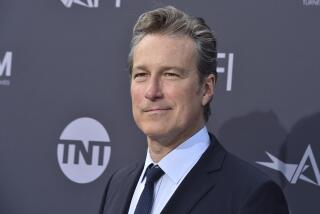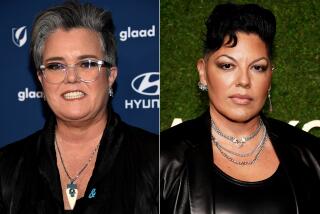‘Sex’ appeal
HOLLYWOOD worships so-called four-quadrant films: movies that draw males and females both young and old. “Sex and the City” might appeal to only a single audience slice, but its following among older women already is so robust that the film could soon prove its doubters wrong.
Few films have polarized audiences more than May 30’s long-awaited cinematic adaptation of the influential HBO show. It’s easier to find $2-a-gallon gas than a straight man eager to see the movie. Older women (in Hollywood’s youth-obsessed view of the world, this means older than 30) hold a dramatically different view: When they are not posting online about their love of the series -- “addicted” pops up with frightening frequency -- they are organizing ladies’ night viewing parties around the film’s opening.
At ShoWest, the annual convention of movie theater owners, earlier this year, exhibitors were sharply divided over “Sex and the City’s” prospects, its naysayers complaining its demographic interest was far too narrow. But as the film’s premiere has drawn closer, curiosity from those moviegoers -- women older than 30 -- has expanded at such a clip that some rival studios are now estimating “Sex and the City” could gross as much as $40 million in its first weekend. Other box office experts say it could fare much worse, perhaps taking in as little as $20 million or so in its first three days, because of its R rating and limited appeal outside of big cities.
In some ways, the film’s fate hinges on one of the series’ recurring questions: Does a little distance make the heart grow fonder?
Almost as soon as the series went off the air in 2004 following a six-season run, HBO and series star and executive producer Sarah Jessica Parker began to kick around movie ideas.
“It wasn’t clear [at that time] that there was a market for it,” says the movie’s writer-director, Michael Patrick King. “It was a movie idea built on the fumes of a popular series. But then syndication became energy, it opened us up to a new audience. The DVD box set was selling big around the world.”
When 2006’s “The Devil Wears Prada” became a worldwide hit with a “Sex and the City” swirl of fashion, single-girl careerism and comic sexcapades, Parker and series creator Darren Star met with former HBO chief executive Chris Albrecht to try to push the big screen blowup into production.
Tripping in heels
After Warner Bros. passed on making the movie (the studio was wary, one insider says, of HBO’s profit participation deal), the project landed at HBO and Warner’s sister company, New Line Cinema. King, who worked on the series as a producer, writer and director, was hired to draft a script, and lawyers started hammering out deals with the show’s cast -- Parker, Cynthia Nixon, Kristin Davis and Kim Cattrall.
But when Cattrall (who plays the vampy diva Samantha) famously held out for a bigger payday and Albrecht was forced out after being arrested for an altercation with his girlfriend in Las Vegas, the filmmakers began to worry that their window of opportunity was closing.
“There was a sense of precariousness about whether it was going to come together in time. There’s a point at which everybody felt like it would have been too late,” says Star, one of the movie’s producers. “People are invested in the lives of these women. But we didn’t want to wait too long to pick up the thread of their stories.”
Big-screen challenge
Indeed, filmmakers who adapt popular television shows face a mind-boggling challenge. As important as execution is, timing also has to be exact.
The film should arrive in theaters while the series still has cultural currency (“The Simpsons Movie” opened while the show was still on) but not wait so long that the title seems like yesterday’s news (“Bewitched”). But, if you play your cards right, you might have “Alvin and the Chipmunks,” “Charlie’s Angels” or “Mission: Impossible.” However, the odds are just as good the interest will have vanished and you’ll get a bomb like “Speed Racer,” “Thunderbirds” or “Rocky and Bullwinkle.”
“The first challenge, the first real clear thought I had, was that the big mistake would be to try to freeze the script and have it be the next day after the series ended,” King says.
“The fans had evolved four years along, [and the] girls had to evolve. Four years is a great span of time. In big cities, you run into people and say, ‘I haven’t seen you in forever. Has it been a year?’ Everybody had to be as current as possible.”
King even reworked the film’s opening to explain what the four women have been up to since we last saw them. And there’s no denying the series still has staying power. In addition to selling millions of DVDs, “Sex and the City” also helped launch Parker’s fashion line.
Several attempts to mimic the HBO series have not done well; among the knockoff duds are the recently canceled “Cashmere Mafia” (on which Star served as executive producer) and the low-rated “Lipstick Jungle” (also based on a book by “Sex and the City” author Candace Bushnell). While those shows might not have been as well made as “Sex and the City,” they raised a question: Had the world moved on?
“I was never concerned that ‘Sex and the City’s’ moment had passed,” King says. “I knew the four characters were authentic and original and alive. They hadn’t been duplicated. I was only concerned with coming up with a story that would be captivating.”
Across the ages
The film’s stars are ancient by Hollywood’s unfortunate standards -- Parker and Davis are 43, Nixon is 42 and Cattrall is 51. To add some youth appeal, 26-year-old “Dreamgirls” Oscar winner Jennifer Hudson was added to the cast.
For whatever reason, some young girls are now expressing interest in the movie, audience surveys show, even though they aren’t old enough to get into an R-rated movie. If “Sex and the City” can start attracting more teenage girls (and appeal to audiences in smaller cities), it just might have a shot at turning into a hit, even though New Line isn’t around to celebrate, having been swallowed by Warner Bros. earlier this year.
“I’m really happy we get to be the swan song of New Line,” King says. “They understand sweeping epics. Look at ‘Lord of the Rings.’ This is like ‘Lord of the Engagement Rings.’ ”
--
More to Read
The biggest entertainment stories
Get our big stories about Hollywood, film, television, music, arts, culture and more right in your inbox as soon as they publish.
You may occasionally receive promotional content from the Los Angeles Times.












